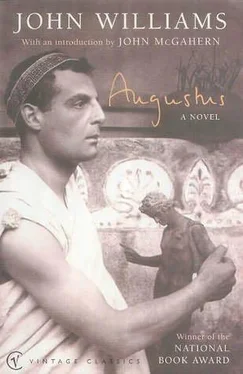John Williams - Augustus
Здесь есть возможность читать онлайн «John Williams - Augustus» весь текст электронной книги совершенно бесплатно (целиком полную версию без сокращений). В некоторых случаях можно слушать аудио, скачать через торрент в формате fb2 и присутствует краткое содержание. Жанр: Историческая проза, на английском языке. Описание произведения, (предисловие) а так же отзывы посетителей доступны на портале библиотеки ЛибКат.
- Название:Augustus
- Автор:
- Жанр:
- Год:неизвестен
- ISBN:нет данных
- Рейтинг книги:3 / 5. Голосов: 1
-
Избранное:Добавить в избранное
- Отзывы:
-
Ваша оценка:
- 60
- 1
- 2
- 3
- 4
- 5
Augustus: краткое содержание, описание и аннотация
Предлагаем к чтению аннотацию, описание, краткое содержание или предисловие (зависит от того, что написал сам автор книги «Augustus»). Если вы не нашли необходимую информацию о книге — напишите в комментариях, мы постараемся отыскать её.
Augustus — читать онлайн бесплатно полную книгу (весь текст) целиком
Ниже представлен текст книги, разбитый по страницам. Система сохранения места последней прочитанной страницы, позволяет с удобством читать онлайн бесплатно книгу «Augustus», без необходимости каждый раз заново искать на чём Вы остановились. Поставьте закладку, и сможете в любой момент перейти на страницу, на которой закончили чтение.
Интервал:
Закладка:
"Otranto," Agrippa says. "It's nearer anyway."
Octavius nods. "And now you must choose. Whoever returns with me commits his fortune to my own. There is no other way, and there can be no turning back. And I can promise you nothing, except my own chance."
Maecenas yawns; he is his old self again. "We came across on that stinking fish boat with you; if we could endure that, we can endure anything."
Octavius smiles, a little sadly. "That was a long time ago," he says, "that day."
We say nothing more, except our good nights.
I am alone in my tent; the lamp sputters on my table where I write these words, and through the tent door I can see in the east, above the mountains, the first pale light of dawn. I have not been able to sleep.
In this early morning stillness, the events of the day seem far away and unreal. I know that the course of my life-of all our lives-has been changed. How do the others feel? Do they know?
Do they know that before us lies a road at the end of which is either death or greatness? The two words go around in my head, around and around, until it seems they are the same.
CHAPTER TWO
I. Letter: Atta and Marcius Philippus to Octavius (April, 44 B. c.)
By the time you receive this letter, my son, you will have arrived at Brindisi and heard the news. It is as I feared: the will is now public, and you have been named Caesar's son and heir. I know that your first impulse will be to accept both the name and the fortune; but your mother implores you to wait, to consider, and to judge the world into which this will of your uncle invites you. It is not the simple country world of Velletri, where you spent your childhood; nor is it the household world of tutors and nurses where you spent your boyhood; nor is it the world of books and philosophy where you spent your youth, nor even the simple world of the battlefield to which Caesar (against my will) introduced you. It is the world of Rome, where no man knows his enemy or his friend, where license is more admired than virtue, and where principle has become servant to self.
Your mother begs you to renounce the terms of the will; you may do so without traducing the name of your uncle, and no one will think the worse of you. For if you accept the name and the fortune, you accept the enmity of both those who killed Caesar and those who now support his memory. You will have only the love of the rabble, as did Caesar; and that was not enough to protect him from his fate.
I pray that you receive this before you have acted rashly. We have removed ourselves from the danger in Rome, and will stay here at your stepfather's place in Puteoli until the chaos has settled into some kind of order. If you do not accept the will, you may travel safely across the country and join us here. It still is possible to lead a decent life in the privacy of one's own heart and mind. Your stepfather wishes to add some words to this.
Your mother speaks to you from the love that is in her heart; I speak to you from my affection, too, but also from my practical knowledge of the world and of the events of the past days.
You know my politics, and you know that there have been occasions in the past when I could not approve of the course that your late uncle pursued. Indeed, I have from time to time found it necessary, as has our friend Cicero, to assert this disapproval on the floor of the Senate. I mention this only to assure you that it is not from political considerations that I urge you upon the course that your mother has advised, but from practical ones.
I do not approve of the assassination, and had I been consulted about it I would most certainly have recoiled with such aversion that I myself might have been in danger. But you must understand that among the tyrannicides (as they call themselves) are some of the most responsible and respected citizens of Rome. They have the support of most of the Senate, and they are in danger only from the rabble; some of them are my friends, and however ill-advised were their actions, they are good men and patriots. Even Marcus Antonius, who has roused the rabble, does not move against them, and will not; for he, too, is a practical man.
Whatever his virtues, your uncle left Rome in a state from which it is not likely soon to recover. All is in doubt: his enemies are powerful but confused in their resolve, and his friends are corrupt and to be trusted by no one. If you accept the name and the inheritance, you will be abandoned by those who matter; you will have a name that is an empty honor, and a fortune that you do not need; and you will be alone.
Come to us at Puteoli. Do not involve yourself in issues whose resolution cannot improve your interest. Keep yourself aloof from all. You will be safe in our affections.
II The Memoirs of Marcus Agrippa: Fragments (13 B. c.)
…and at that news and in our grief we acted. We made haste to sail and had a stormy crossing to Otranto, where we landed in the dark of night and did not let our persons be known to any. We slept at a common inn and made our servants absent themselves, so that no one might suspect us; and before dawn we set out on foot toward Brindisi, as if we were country folk. At Lecce we were halted by two soldiers who watched the approach to Brindisi; and though we did not give our names, we were recognized by one who had been in the Spanish campaign. From him we learned that the garrison at Brindisi would welcome us, and that we might go there without danger. One walked with us while the other went ahead to tell of our coming, and we came to Brindisi with the full honor of a guard and the soldiers ranked on either side of us as we came into the city.
There we were shown a copy of Caesar's will which named Octavius his son and legatee, and gave his gardens to the people for their recreation and to every citizen of Rome three hundred pieces of silver from his fortune.
We had what news there was of Rome, which writhed in disorder; we had the names of those who murdered Caesar, and knew the lawlessness of the Senate that sanctioned the murder and set the murderers free; and we knew the grief and rage of the people under that lawless rule.
A messenger from the household of Octavius awaited us, and gave him letters from his mother and her husband which, out of their affection and regard, urged upon him that renunciation of the legacy which he could not make. The uncertainty of the world and the difficulty of his task strengthened his resolve, and we called him Caesar then and gave him our allegiance.
Out of their veneration for his murdered father and their love for his son, the legion at Brindisi and veterans from miles around thronged about him, urging him to lead them in vengeance against the murderers; but he put them off with many words of gratitude, and we went quietly in our mourning across the land, from Brindisi along the Appian Way to Puteoli, whence we purposed to enter Rome at a propitious time.
III. Quintus Salvidienus Rufus: Notes for a Journal, at Brindisi (44 B.C.)
We have learned much; we understand little. It is said that there were more than sixty conspirators. Chief among them were Marcus Junius Brutus, Gaius Cassius Longinus, Decimus Brutus Albinus, Gaius Trebonius-all supposed friends of Julius Caesar, some of whose names we have known since childhood. And there are others whom we do not yet know. Marcus Antonius speaks against the murderers, and then entertains them at dinner; Dolabella, who approved the assassination, is made consul for the year by that same Antonius who has denounced the enemies of Julius Caesar.
What game does Antonius play? Where do we go?
IV. Letter: Marcus Tullius Cicero to Marcius Philippus (44 B. c.)
I have just learned that your stepson, with three of his young friends, is even now on his way from Brindisi, where he landed only a few days ago; I am hastening this letter to you, so that you might have it before his arrival.
Читать дальшеИнтервал:
Закладка:
Похожие книги на «Augustus»
Представляем Вашему вниманию похожие книги на «Augustus» списком для выбора. Мы отобрали схожую по названию и смыслу литературу в надежде предоставить читателям больше вариантов отыскать новые, интересные, ещё непрочитанные произведения.
Обсуждение, отзывы о книге «Augustus» и просто собственные мнения читателей. Оставьте ваши комментарии, напишите, что Вы думаете о произведении, его смысле или главных героях. Укажите что конкретно понравилось, а что нет, и почему Вы так считаете.











